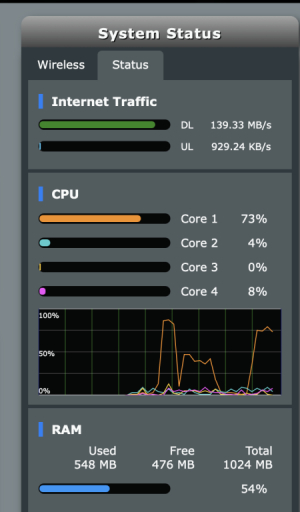Have there been any changes to Wireguard implementation?
I used to get over 80 megabytes p/s with the same VPN provider before, but now it hovers around 20 - and I suspect it's because core 1 is being used to the max, i.e. the CPU is throttling?

I do not have screenshots from 'before', but from what I remember the usage split between cores was much more even than now.
Running 3004.388.8_4 on XT12.
I used to get over 80 megabytes p/s with the same VPN provider before, but now it hovers around 20 - and I suspect it's because core 1 is being used to the max, i.e. the CPU is throttling?
I do not have screenshots from 'before', but from what I remember the usage split between cores was much more even than now.
Running 3004.388.8_4 on XT12.



